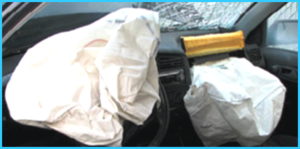 NHTSA is expanding and accelerating the recall of deadly Takata air bag inflators. The decision follows the agency’s confirmation of the root cause behind the inflators’ propensity to rupture. Takata inflators have been tied to ten deaths and more than 100 injuries in the United States.
NHTSA is expanding and accelerating the recall of deadly Takata air bag inflators. The decision follows the agency’s confirmation of the root cause behind the inflators’ propensity to rupture. Takata inflators have been tied to ten deaths and more than 100 injuries in the United States.
This is the largest and most complex safety recall in U.S. history. Under the Coordinated Remedy Program, NHTSA and manufacturers have committed to seek a 100% recall completion rate – laughable to anyone who knows that a 70% rate is historically impressive.
Under the Amended Consent Order issued to Takata this week, the company is required to make a series of safety defect decisions that will support vehicle manufacturer recall campaigns of an additional estimated 35-40 million inflators, adding to the already 28.8 million inflators previously recalled.
The expansions are planned to take place in phases between May 2016 and December 2019. The expansions mean that all Takata ammonium nitrate-based propellant driver and passenger frontal air bag inflators without a chemical drying agent, also known as a desiccant, will be recalled.
“Today’s action is a significant step in the U.S. Department of Transportation’s aggressive oversight of Takata on behalf of drivers and passengers across America,” said Transportation Secretary Anthony Foxx.
The five recall phases are based on prioritization of risk, determined by the age of the inflators and exposure to high humidity and fluctuating high temperatures. These accelerate the degradation of the chemical propellant.
NHTSA and its independent expert reviewed the findings of three independent investigations into the Takata air bag ruptures. A combination of time, environmental moisture and fluctuating high temperatures contribute to the degradation of the ammonium nitrate propellant in the inflators. Such degradation can cause the propellant to burn too quickly, rupturing the inflator module and sending shrapnel through the air bag and into the vehicle occupants.
NHTSA will also consult with affected vehicle manufacturers before revising the Coordinated Remedy Order that governs the accelerated program to obtain and install replacement inflators. The Coordinated Remedy Program will continue to ensure that replacement inflators will be made available to highest-risk vehicles first.
The revised Coordinated Remedy Program, to be announced this summer, will detail the updated vehicle prioritization schedule and the schedule by which manufacturers are required to procure sufficient supply of replacement parts to conduct the required recall repairs.
The recall expansion does not include inflators that include a chemical desiccant that absorbs moisture. There have been no reported ruptures of the desiccated inflators due to propellant degradation. Under the Amended Consent Order, Takata is required to redirect its research toward the safety of the desiccated inflators. Absent proof that the desiccated inflators are safe, Takata will be required to recall them under the November 2015 Consent Order.
In 2015, NHTSA imposed the largest civil penalty in its history for Takata’s violations of the Motor Vehicle Safety Act, and for the first time used its authority to accelerate recall repairs to millions of affected vehicles. NHTSA also appointed an Independent Monitor to assess, track and report the company’s compliance with the Consent Order and to oversee the Coordinated Remedy Program.

